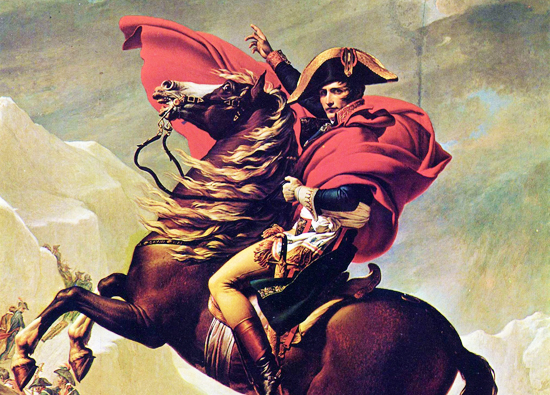03.2023 Story
An Analysis of Napoleon's Image in Different Literary Works
Yuanfang Industry (Shanghai) / Xiong Yifang


.jpg) Napoleon is often read in foreign literary works. His heroic image has long been deeply rooted in the hearts of the people. Many historians are still studying every battle of Napoleon, but literary critics still have mixed opinions on him.
Napoleon is often read in foreign literary works. His heroic image has long been deeply rooted in the hearts of the people. Many historians are still studying every battle of Napoleon, but literary critics still have mixed opinions on him.It is said that when Zweig wrote "The Stars of Man Shine", the first article was Napoleon's "Battle of Waterloo". He named this article "A Minute to Decide the World". Although it was not long, and he did not pay much attention to the battlefield, he still reserved a small part of it to describe Gruchy's misjudgment of the situation.
At the order of Napoleon, Gruchi pursued the Prussian army and prevented them from joining the British army. However, when Britain and France were caught in a tug-of-war, he led a third of the French army to wander in the field and failed to respond to the situation at the critical moment and go to support; At the same time, Wellington and Blucher (the commander of the British army and the French army) met successfully and defeated Napoleon. This is exactly what the author wants to express: history only gives people one second to become the master of fate, and Gruchi missed it, resulting in the tragic defeat of genius (Napoleon).
In the title "The Miserable World", the military strength, strategic fortress and specific process of the two sides involved in the "Battle of Waterloo" are described in more detail, and the elements of the novel are added. Even Hugo, who firmly supported republicanism, could not restrain his admiration for Napoleon between the lines. He believed that Napoleon's failure was due to his personal weight. "The world is sublimated into his head". In the long run, it will break the balance of human destiny and bring a huge blow to mankind. Therefore, despite the bleak war situation, the brilliance of genius cannot be buried.
It is interesting that Tolstoy saw the mediocrity of genius in Napoleon's heyday. In the book War and Peace, the history involved includes the "Battle of the Three Emperors" and the "Battle of Moscow Defense". The former is undoubtedly the peak of Napoleon's achievements and the most wonderful part of the book. Tolstoy wrote about the arrangement of troops on both sides, but did not focus on the commander, but focused on the officers and soldiers on the front line of the war. He described that they failed to receive instructions in time and had to spontaneously adjust their strategies, or attack, or retreat, under the influence of various factors, thus promoting the change of the whole war situation. When reading, the reader seems to be able to clearly see the whole picture of the battle, which is the true perspective of God, rather than being confined to the commander.
Tolstoy criticized Napoleon as a "genius". He pointed out that the overall plan of war is important, but when it comes to the battlefield, the situation changes rapidly, and its role has weakened a lot. In addition, the commander was in the rear, the real battle was in the front, and the command could not be delivered in time, which was also the reason why the "war report was chaotic and the comments were contradictory" at that time. So the military talent of "genius" may not have such a great impact on the war situation, but it is just an illusion in the process of history.
The writers have interpreted Napoleon from different angles in diametrically opposite ways, leaving us room for thinking.
Image source: pixabay
#


















